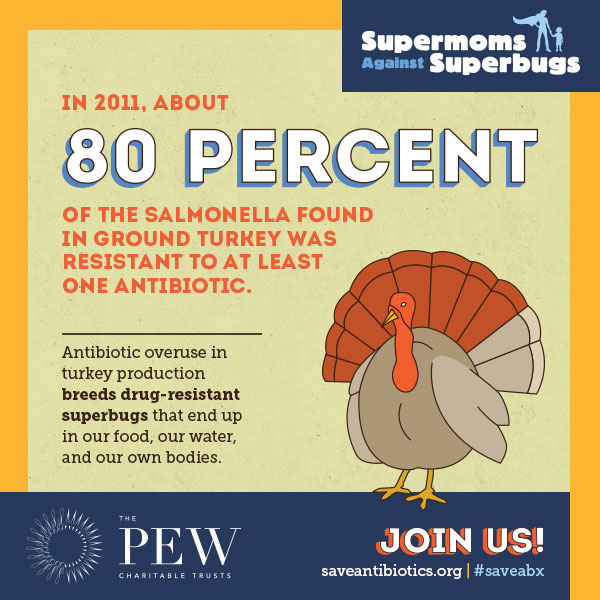3 Tips for Setting a Sustainable Table This Thanksgiving
This Thanksgiving, as Americans think of family and feasting, consumers can use the opportunity to encourage a food production system that promotes and protects our health.
Unfortunately, antibiotic overuse on livestock poses a threat to human health. More than 20 million pounds of the drugs important in human medicine are sold every year for use on industrial farms, sometimes to treat sick animals but often to make healthy animals grow faster and to compensate for overcrowded and unsanitary conditions. These practices breed drug-resistant bacteria that can infect and hospitalize people.

Here are three things you can do this holiday season to promote the responsible use of antibiotics in meat and poultry production.
1. Vote with your wallet.
When you're shopping, look for meat and poultry with the following labels:
- “Raised without antibiotics”
- “No antibiotics administered”
- “No antibiotics ever”
- “Organic”
- “Animal Welfare Approved”
Other labels, such as “all natural” and “antibiotic free,” don't necessarily mean the food you're buying was produced without antibiotics.
Check out the Environmental Working Group's label decoder for more information.
2. Urge your local schools to encourage responsible antibiotic use in agriculture.
If you represent one vote for change, then an institution that buys large quantities of meat and poultry represents thousands of votes.
| “Every time you spend money, you're casting a vote for the kind of world you want.” —Anna Lappé, author of “Diet for a Hot Planet” |
Your local schools can encourage responsible food production by asking their food service providers to buy meat and poultry from farms that don't misuse antibiotics. Chicago Public Schools, Jefferson County (CO) Public Schools, and other early leaders have taken that step. Call your principal, your school board representatives, and your school superintendent, and tell them that you want your children to have what Chicago's and Jefferson County's students have.
You can even get your local PTA involved. The New York State PTA recently passed a resolution urging school systems to buy meat and poultry raised without antibiotics.
Click here to download a letter that you can send school officials, outlining what steps they can take to protect our children's health. And share these draft purchasing guidelines for institutions and a request for proposals template (PDF) that any school district can adapt and use.
3. Make your voice heard in Washington.
President Barack Obama and Congress have the power to end antibiotic overuse on industrial farms. Visit Pew's action center to learn more about effective legislation and regulation, and with just a few clicks, urge your elected officials to support these measures.
To protect yourself from foodborne illness, check out the CDC's website for safe food preparation and handling tips.











